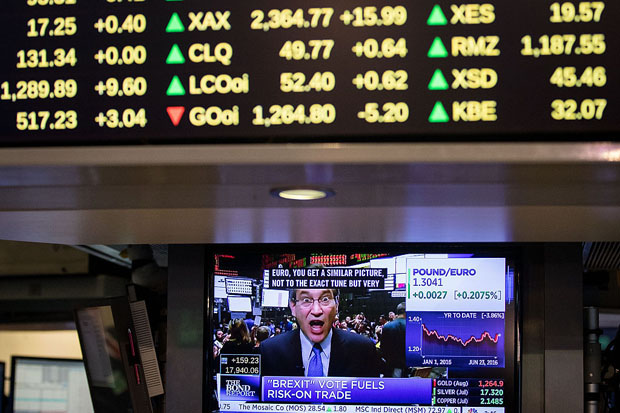I enjoyed the Daily Mail’s lambasting of the Financial Times as ‘panic-monger-in-chief’ for its doom-laden post-Brexit tone: ‘Is it determined to provoke a downturn in a bid to justify its lurid predictions?’ And I’m happy to let ‘Britain’s most self-important business newspaper’ take some flak, my own rather downbeat column last week having been so at odds with our ‘optimist’s guide’ on other pages.
Panic-mongering used to be the Mail’s own stock-in-trade back in the Gordon Brown era, when it regularly invited me to wax apocalyptic on ‘the death of the middle classes’ in response to stock-market wobbles and stealth taxes. But there’s a serious point behind its FT-bashing, which is that short-term uncertainty might only turn into recession if we talk ourselves down.
But is that really so, or is the full impact of Brexit coming at us with the force of a derailed train, and nothing anyone says will make the slightest difference? Some economic shocks follow events — epidemic, earthquake, war — while others amplify pessimism in anticipation of events yet to come. This one is currently in the second category, and will only migrate towards the first when foreign-owned car factories start closing and the infrastructure projects I listed last week are actually cancelled.
In the meantime, you don’t have to subscribe to the Johnsonian rhetoric about glorious new trading horizons to recognise that, so far and in parts, investor sentiment has held up better than expected. Despite the loss of our triple-A credit rating, UK government bonds are still sought as a safe haven — hence record low yields. The robustness of the FTSE100 index reflects that fact that, following the pound’s fall against the dollar, international investors can buy shares in London-listed global companies at bargain prices, and those companies will likely report higher sterling profits from overseas operations. But a flurry of directors’ buying of shares in their own companies shows a more fundamental belief that predictions of doom may turn out to be exaggerated.
So let’s wait for a consistent pattern to form, while resisting panic-mongering, hollow optimism and generalisation from isolated stories. But having said that, here’s one I must pass on. I mentioned recently the owner of a ‘professional services firm’ (in the construction sector, as it happens) who told me told me he expected to make 50 of his 180 staff redundant if we voted for-Brexit. I bumped into him again. What news? ‘Two major projects cancelled the day after the vote. I’ve already had to let ten people go. And our biggest London site has been
graffitied by British construction workers telling the Polish ones to go home.’
Foxy or fearsome?
Women who made an impact on the very masculine trading floors of the 1980s City were generally foxy or fearsome or both, but never shrinking violets. I wondered which stereotype fitted would-be Conservative leader Andrea Leadsom in her years at BZW — the Barclays investment banking arm of which I was myself a director, though our paths never crossed there.
She started in 1987 selling commercial paper (short-term corporate debt) in a market of wafer-thin margins and little or no excitement, so unlike former Lib Dem MP David Laws — a member of a BZW team that made huge profits from falling sterling interest rates in the early 1990s — she probably never collected a mega-bonus. Colleagues remember her as ‘hard-working’, ‘unexceptional’ and ‘a devotee of the gym’, with a voice that carried across the trading floor as easily as it did across Wembley Arena in the final Brexit debate.
Her real Barclays heyday came later, when she was the bank’s account officer for Barings at the time of its collapse at the hands of Nick Leeson in 1995. She had been reassured by a Barings director three weeks earlier that rumours of huge losses in Leeson’s Singapore unit were entirely false. But they were true, and she spent the weekend of the crash at the Bank of England trying (unsuccessfully as it transpired) to cobble together a rescue consortium.
She went on to make a calmer senior career in fund management, working first for her brother-in-law Peter de Putron (a Guernsey-based Tory donor on whom her detractors are keen to shine a spotlight) and later at Invesco Perpetual. But early experience of financial crisis — combined with a capacity to shout louder than the men around her and spot when they’ve been lying — should stand her in good stead for whatever turns out to be her next job.
Unsold gem
Pottering down Bond Street in search of post-Brexit parables, I sense a buzz around the entrance of Sotheby’s. Inquiries reveal that the second-largest gem-quality-diamond ever discovered, the 1,109-carat ‘Lesedi la Rona’, is about to go under the hammer — not literally, of course, since a buyer might prefer to cut the stone into the world’s largest single polished diamond, outshining the Great Star of Africa, rather than make multiple smaller pieces from it. Discovered last year in the Karowe mine in Botswana, this fishcake-sized wonder of nature was exhibited around the world before coming to the London auction room where it was expected to fetch $70 million, with whispers of up to $100 million.
But on the night the highest bid was just $61 million, and the lot was withdrawn. Could Brexit uncertainty have deterred even the highest of high-end gem buyers? Or was the truth the very opposite, that in the absence of investor panic there was insufficient demand for this ultimate item of transportable wealth, the pocket equivalent of a ton and a half of gold? The real reason for the disappointment is more likely that big rough diamonds are best sold privately, rather than at public auction, in a trade that prefers to keep its business secret. And perhaps the moral of this item is that at times of turmoil, we’re too often eager to stretch evidence that reinforces our own mood.







Comments